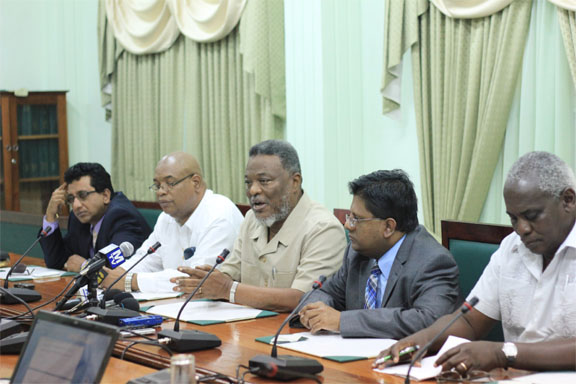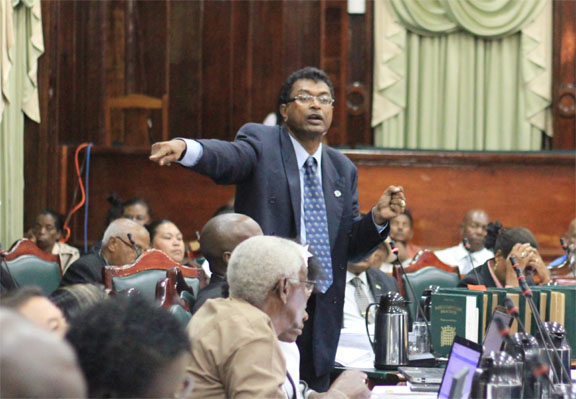Speaker Raphael Trotman yesterday upheld the National Assembly’s right to reduce the national budget, clearing the way for the opposition to proceed with planned cuts to some of government’s proposed spending for the year.
Although government contended that an interim court ruling on cuts that were made last year had established that the National Assembly could only pass the budget or reject it in its entirety, Trotman said it could not be bound by a “preliminary” decision.
“The National Assembly of the Parliament of Guyana has the power to amend, by reducing only, the Estimates of Expenditure submitted by the Minister responsible for Finance,” he announced, to loud desk thumping from the opposition members while those on the government side sat in stony silence.
“The political system practised in Guyana does not negative the authority of the National Assembly to amend Bills and Motions, including those dealing with public finance,” he added, though cautioning that the power to amend cannot be “used, injudiciously, whimsically, and/or wantonly.”
Trotman’s decision came after almost five hours of arguments on Monday upon a Motion submitted by AFC leader Khemraj Ramjattan, in which he proposed more than $35B in cuts to various sectors. Trotman’s ruling in effect means that the motion is properly before the House.

Apart from amending the budget, he said, the House could also reject the entire budget or accept it without any amendments. He, however, warned that the right to amend is not to step across and “give a blow” but rather to ensure that people are given the best representation possible.
“The power to amend must not be exercised capriciously, vengefully, or wantonly and without any rational basis. The preeminent duty of the National Assembly is to pass laws for the peace, order and good government of the State of Guyana. In recognising this right to amend, I believe that it will be exercised responsibly and within the spirit of the constitution. To do otherwise would be to invite a Court to vacate any amendments as being predicated on wrongful, unreasonable and an unconstitutional use of power,” he further warned.
Minutes after Trotman delivered the ruling, Prime Minister Samuel Hinds said government would abide by it. But government speakers an hour later told a news conference that the decision would place the country in a “political black hole” and headed towards anarchy. Among them was Attorney General Anil Nandlall, who did not rule out fresh moves to the courts to challenge the impending cuts but said it is a decision Cabinet would have to make.
Opposition Leader David Granger expressed satisfaction with the outcome, while assuring that the opposition parties had sought an audience with President Donald Ramotar to ensure there was no accusation of wantonness or arbitrariness on their behalf and their desire to seek a consensual outcome to the budget debate. They were accommodated and they would be seeing the President again this morning, he noted.
“I believe your ruling today is a landmark ruling… for parliamentary democracy,” Granger said to the Speaker, adding that while last year the opposition was called all kinds of names, he hoped the ruling would put an end to such acrimony and the parties can get down to the business of the country.
Ramjattan said that it was a transformational ruling and expressed the hope that the government side would abide by it and not “hustle across to the High Court.”
‘Way forward’
Trotman later made some suggestions as to the way forward, while noting that the ruling was easier than pointing the House in the direction that is “nationally wholesome.”
In reaching the decision, he cited the works of experts from around the world, a long list of rulings including one by his predecessor and Finance Minister Dr Ashni Singh’s statement during the last budget debates about the opposition’s right to amend the budget and his promise to defend that right. Singh said on Monday that those remarks were made in an “unprecedented atmosphere.”

Trotman pointed out that those who gave and those who received the instruments of independence could never have intended that such a hallowed right and privilege of the National Assembly to “amend” estimates would be usurped, surrendered, or so given up. Correspondingly, he noted, such an important right must be used responsibly.
As a result, he suggested that Singh has two choices: if the amendments to the estimates are adopted by a majority in the Committee Supply, he may either report that the government accepts the amendments or he may indicate that he is withdrawing the estimates entirely as his government does not accept the amendments and see them as “an indication of lack of confidence in the government.”
“It is for the government to make a calculated political decision as to whether it can live with the amended estimates or not. If it cannot, then the decision is obvious,” Trotman said.
He also pointed out that last year when the amendments to the estimates were proposed and later reluctantly accepted by the executive, the country did not fall apart. “We have passed this way once before and now have a better definition of what to expect and we know that we can survive. The decision is ours to make—to embrace the realities and opportunities of the 10th Parliament or to ignore them altogether,” he said.
Touching on acting Chief Justice Ian Chang’s preliminary ruling, Trotman said that while he is not using the Speakership to exercise an appellate or review function over the High Court, what is incontrovertible is the fact that “there is no burden, or duty, placed on this House, to adopt or enforce rulings of the High Court….”
“…I am not convinced that the High Court exercises a supervisory jurisdiction over the National Assembly. What it can do, is review decisions made by the National Assembly to ensure constitutional compliance,” he stated.

He said it was previously indicated that the National Assembly will observe, strictly, the concept of the separation of the powers and, with it, the recognition of the fundamental pillar that it is in charge of its own procedures.
Further, Trotman stated that unless or until the Standing Orders of the National Assembly are deleted, they must be recognised, applied, and upheld in the National Assembly, since they provide the only procedure of the House.
“This House cannot, with the greatest of respect, be bound by a “preliminary” ruling of the High Court made on interlocutory application for interim relief, over and above its own Standing Orders, but can, and does, invite those with a deep interest, in matters constitutional, to engage the judiciary to provide a more final and definitive ruling on this issue, as a means of providing guidance and interpretation for the House’s fullest consideration,” he declared.
He noted that it has been suggested that because the word “amendment” is not included in the Constitution’s language then the National Assembly cannot amend the estimates. “This is quite a quantum leap to take. If taken to its logical conclusion, its manifest absurdity is immediately evident,” he pointed out.
Were that the case, that the House has no power to amend, Trotman noted, it would render the function of, and necessity for, the Committee of Supply obsolete as it would have a “simple robotic function of approving or disapproving the Estimates—a mere minute’s work.”
“Bizarre state of affairs’
Meanwhile, Nandlall later told a press conference that Trotman’s ruling is placing the country in a “precipice situation” and he called it a “bizarre state of affairs.”
Hinds said the government had expected a different ruling, in light of the strong arguments of its speakers on Monday but they now “want to get on with the business of our country, we want to have a budget in place for 2013 and we are proceeding with the estimates.”
According to Nandlall, it is not a matter of “cuts or no cuts” but rather “acting beyond the powers that you have.”
“Because the Constitution mandates a budget to be presented within a constitutionally prescribed time so we are doing that as we did in 2012 and

then we take it from there,” he argued.
He said too that the government cannot bring the nation to a halt as a result of “irrationality of a majority in the National Assembly” or else they would succumb to that “irrationality.” However, he said as wrong as the Speaker’s ruling is, he is not sure on how to advise the administration since his advice could be to disregard everything that the Parliament is doing.
“But by doing that, by taking a strict legal position, I can expose the nation to untold damages because the nation’s business would come to a halt without these expenditures, these estimates being approved… So it is not an easy situation. Hence, my description of it as a conundrum” Nandlall said.
He did not rule out bringing fresh challenges to the process but said the option would have to be discussed and decided upon collectively by Cabinet.
Asked directly if the government is prepared to go to the polls as a result of the development, Nandlall said that the administration’s first position is to ensure it complies with all the laws of the land and discharges its responsibilities.
“Those [responsibilities] include, among them, the presentation of a national budget for the country. If we are prevented from so doing, an elections is the only alternative to which we can resort other than by destruction of the national interest. Then, I presume, our choices would have been extremely confined to that one issue,” he explained.
Minister of Transport Robeson Benn pointed out that the budgetary allocation for the Guyana Elections Commission (Gecom) would be cut severely and one wonders what shape it would be in to run an election given the proposals.
“But both options are open: the option to file fresh proceedings because this is a new ruling and this has taken the matter even further because here the Speaker has rejected the jurisdiction of the courts to review the proceedings of Parliament…” Nandlall said.
Singh said it is the duty of the government to exhaust every avenue available to ensure the passage of the budget, while adding that the administration has no difficulty subjecting the estimates to scrutiny in the committee of supply and no difficulty to answering questions.




